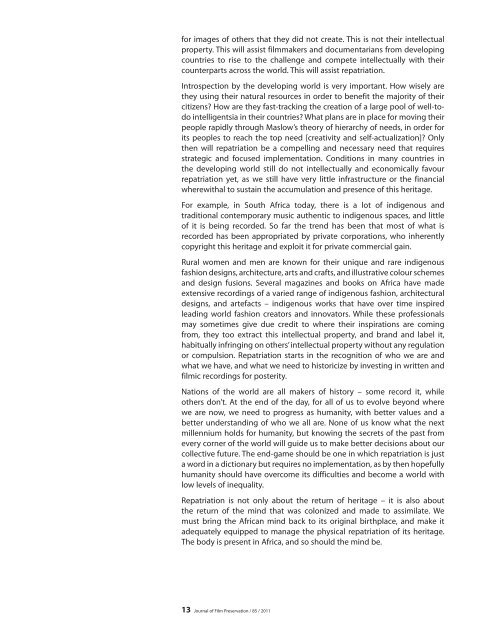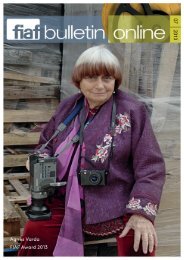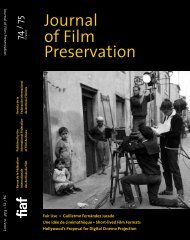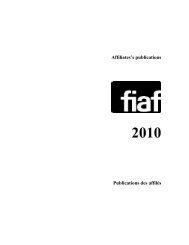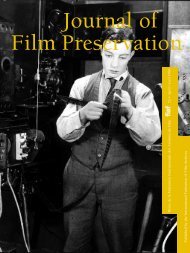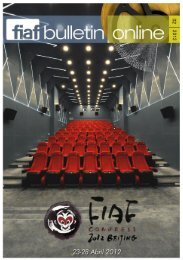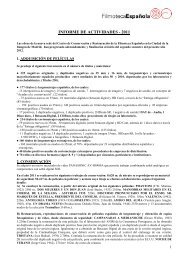Journal of Film Preservation - FIAF
Journal of Film Preservation - FIAF
Journal of Film Preservation - FIAF
You also want an ePaper? Increase the reach of your titles
YUMPU automatically turns print PDFs into web optimized ePapers that Google loves.
for images <strong>of</strong> others that they did not create. This is not their intellectual<br />
property. This will assist filmmakers and documentarians from developing<br />
countries to rise to the challenge and compete intellectually with their<br />
counterparts across the world. This will assist repatriation.<br />
Introspection by the developing world is very important. How wisely are<br />
they using their natural resources in order to benefit the majority <strong>of</strong> their<br />
citizens? How are they fast-tracking the creation <strong>of</strong> a large pool <strong>of</strong> well-todo<br />
intelligentsia in their countries? What plans are in place for moving their<br />
people rapidly through Maslow’s theory <strong>of</strong> hierarchy <strong>of</strong> needs, in order for<br />
its peoples to reach the top need [creativity and self-actualization]? Only<br />
then will repatriation be a compelling and necessary need that requires<br />
strategic and focused implementation. Conditions in many countries in<br />
the developing world still do not intellectually and economically favour<br />
repatriation yet, as we still have very little infrastructure or the financial<br />
wherewithal to sustain the accumulation and presence <strong>of</strong> this heritage.<br />
For example, in South Africa today, there is a lot <strong>of</strong> indigenous and<br />
traditional contemporary music authentic to indigenous spaces, and little<br />
<strong>of</strong> it is being recorded. So far the trend has been that most <strong>of</strong> what is<br />
recorded has been appropriated by private corporations, who inherently<br />
copyright this heritage and exploit it for private commercial gain.<br />
Rural women and men are known for their unique and rare indigenous<br />
fashion designs, architecture, arts and crafts, and illustrative colour schemes<br />
and design fusions. Several magazines and books on Africa have made<br />
extensive recordings <strong>of</strong> a varied range <strong>of</strong> indigenous fashion, architectural<br />
designs, and artefacts – indigenous works that have over time inspired<br />
leading world fashion creators and innovators. While these pr<strong>of</strong>essionals<br />
may sometimes give due credit to where their inspirations are coming<br />
from, they too extract this intellectual property, and brand and label it,<br />
habitually infringing on others’ intellectual property without any regulation<br />
or compulsion. Repatriation starts in the recognition <strong>of</strong> who we are and<br />
what we have, and what we need to historicize by investing in written and<br />
filmic recordings for posterity.<br />
Nations <strong>of</strong> the world are all makers <strong>of</strong> history – some record it, while<br />
others don’t. At the end <strong>of</strong> the day, for all <strong>of</strong> us to evolve beyond where<br />
we are now, we need to progress as humanity, with better values and a<br />
better understanding <strong>of</strong> who we all are. None <strong>of</strong> us know what the next<br />
millennium holds for humanity, but knowing the secrets <strong>of</strong> the past from<br />
every corner <strong>of</strong> the world will guide us to make better decisions about our<br />
collective future. The end-game should be one in which repatriation is just<br />
a word in a dictionary but requires no implementation, as by then hopefully<br />
humanity should have overcome its difficulties and become a world with<br />
low levels <strong>of</strong> inequality.<br />
Repatriation is not only about the return <strong>of</strong> heritage – it is also about<br />
the return <strong>of</strong> the mind that was colonized and made to assimilate. We<br />
must bring the African mind back to its original birthplace, and make it<br />
adequately equipped to manage the physical repatriation <strong>of</strong> its heritage.<br />
The body is present in Africa, and so should the mind be.<br />
13 <strong>Journal</strong> <strong>of</strong> <strong>Film</strong> <strong>Preservation</strong> / 85 / 2011


